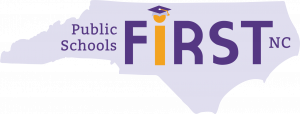New Research Confirms: High-Quality Pre-K Programs Have Wide-Reaching Benefits
A new study shows that there are benefits to the entire school when students come to elementary school after attending a high-quality pre-K program.
This new study by Duke researcher Dr. Helen “Sunny” Ladd and her colleagues shows that elementary school environments, including teacher perceptions and retention, also benefit from high-quality pre-K programs. In other words, the whole school benefits when more students come to school after attending NC Pre-K.
Plenty of research has shown significant direct benefits for the children enrolled in high-quality pre-K programs, including both short-term and long-term gains. Students are better prepared to learn when entering kindergarten, have smoother transitions to first grade, and are more likely to meet or exceed proficiency standards in third grade reading and math (1). They also have greater academic achievement in later grades, increased high school graduation rates and increased college attendance rates (2).
Ladd and her colleagues studied the impact of North Carolina’s NC Pre-K program, a public preschool program started under the name “More at Four” in 2001. Children are eligible if their families have an annual income at or below 75% of the state’s median income. Children may also be eligible if they are part of a military family or have an identified risk factor such as being an English language learner, having an identified disability, a chronic illness, a developmental need, or are homeless.
The program funds any type of pre-K setting, including those located in a public school, Head Start, private, or-non-profit organization. NC Pre-K pays for student “slots” not whole classrooms, so any classroom may include students funded through NC Pre-K. However, to qualify for funding for NC Pre-K slots, the organization must meet the NC Pre-K high quality standards, including criteria regarding curricula, class size, teacher and administrator training and education levels, and other program services.
NC- Pre-K has a long history of meeting high quality benchmarks. Between 2002 and 2021, it met an average of 9.3 of the 10 quality benchmark standards (3) set by the National Institute for Early Education Research (NIEER).
As a result, students who are enrolled in facilities that include NC Pre-K students also experience the benefits of the high quality standards. These are known as “spillover effects.” In a study looking at the effect on all children—those directly funded as well as their classmates—of increased funding for NC Pre-K (i.e. More at Four/Smart Start) programs, researchers found that children from both low-income and high-income families experience significant positive impacts on reading and math scores, reduction in special education placement, and reduction in grade retention in all elementary school grades (4).
In their recent research, Ladd and her colleagues explored even more spillover effects. They wondered whether having a larger share of former NC Pre-K students among the economically disadvantaged students in an elementary school would create a more favorable teaching environment.
They studied schools with some configuration of K-6 grades across all years 2004 - 2018 and found that by enhancing the academic and social readiness at school entry of pre-K eligible children, NC Pre-K improved the elementary school learning environment, the teaching environment, and teachers’ work satisfaction.
A 10 percentage-point increase in the share of economically disadvantaged children in the school who had attended NC Pre-K was associated with significant increases in overall teacher satisfaction and with teachers’ perceptions that they had adequate time for the role of educating students. It was also associated with a significant increase in teacher and principal retention rates.
These findings bolster the case for policymakers and elected officials to prioritize increased access to early childhood programs and high-quality pre-K programs such as NC Pre-K. By improving school readiness of students, and improving academic outcomes for students, the whole school benefits through more positive working environments for teachers and principals. These improved working environments may in turn lead to more positive learning environments for students.
NC has a stated policy goal of enrolling at least 75% of all income-eligible children in NC Pre-K by 2030. My Future NC reports that 2023 enrollment was just 53% of NC’s eligible children based on family income, leaving 47% of the state’s vulnerable children—approximately 23,500 children per year—unable to access high-quality pre-K.
The National Institute for Early Education reported that the primary barrier to NC Pre-K enrollment was inadequate state funding (5). These funds are needed to increase the number of available slots statewide, but also to reduce barriers for programs seeking to become NC Pre-K sites. Currently, the state requires local communities to match the state investment, which creates a barrier for poor, often rural communities and decreases their participation rates.
This new research provides compelling evidence that spending more to ensure maximum enrollments in NC Pre-K programs is well worth the investment.
(1) New look at benefits of quality preschool education: https://www.washingtonpost.com/education/2023/05/08/new-look-benefits-quality-preschool-education/
(2) The long-term effects of universal preschool in Boston: https://www.nber.org/system/files/working_papers/w28756/w28756.pdf
(3) Understanding Heterogeneity in the Impact of Public Preschool programs: https://srcd.onlinelibrary.wiley.com/doi/abs/10.1111/mono.12463
(4) Impact of North Carolina’s Early Childhood Programs and Policies on Educational Outcomes in Elementary School: https://dukespace.lib.duke.edu/server/api/core/bitstreams/9ef82a9f-98b5-4dca-b16e-130a5efd59ea/content
(5) Barriers to expansion of NC Pre-K: https://nieer.org/research-library/barriers-expansion-nc-pre-k#:~:text=North%20Carolina%27s%20preschool%20program%20has,Institute%20for%20Early%20Education%20Research.
Heather Koons
Public Schools First NC
hhkoons@gmail.com
Visit us on social media:
Facebook
X
LinkedIn
Instagram
YouTube
TikTok
Legal Disclaimer:
EIN Presswire provides this news content "as is" without warranty of any kind. We do not accept any responsibility or liability for the accuracy, content, images, videos, licenses, completeness, legality, or reliability of the information contained in this article. If you have any complaints or copyright issues related to this article, kindly contact the author above.

